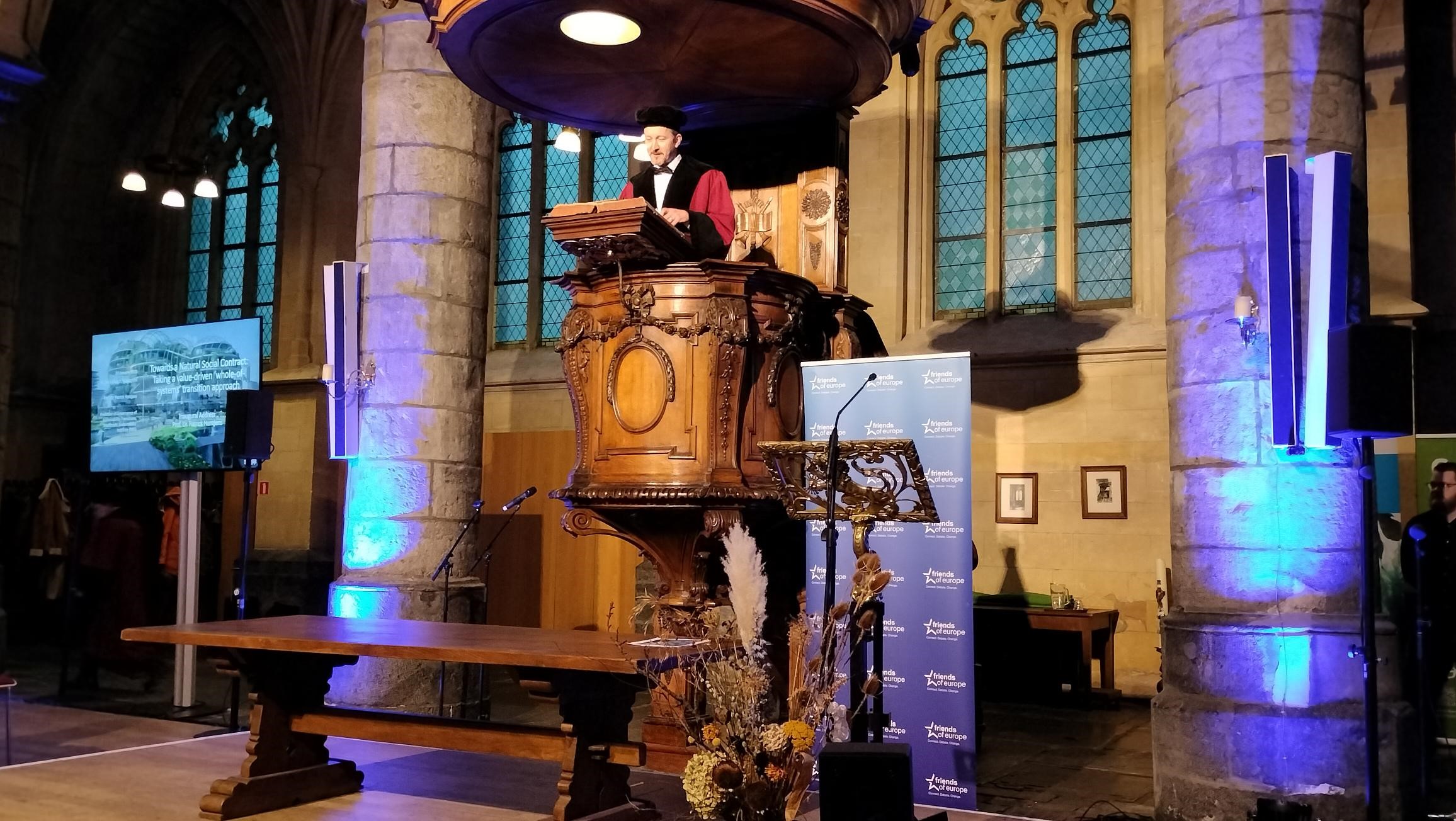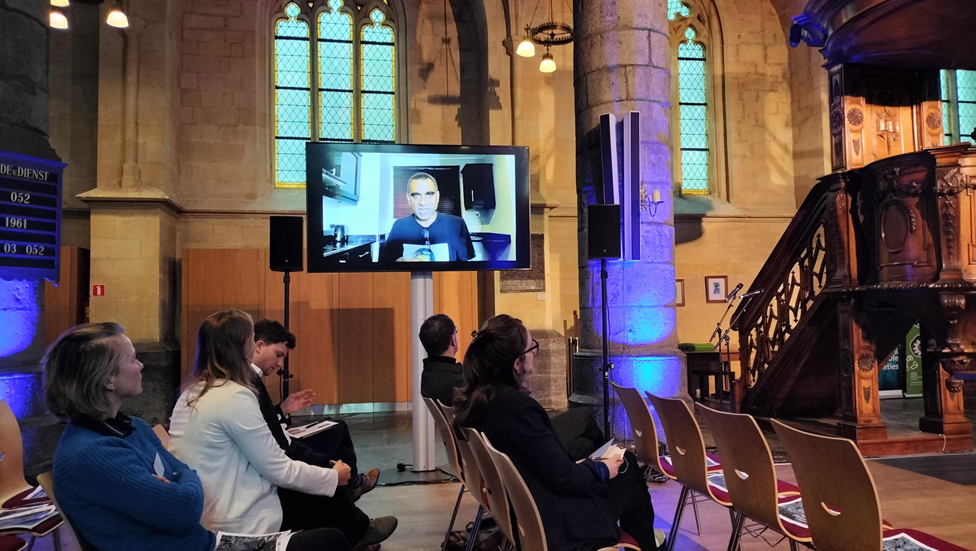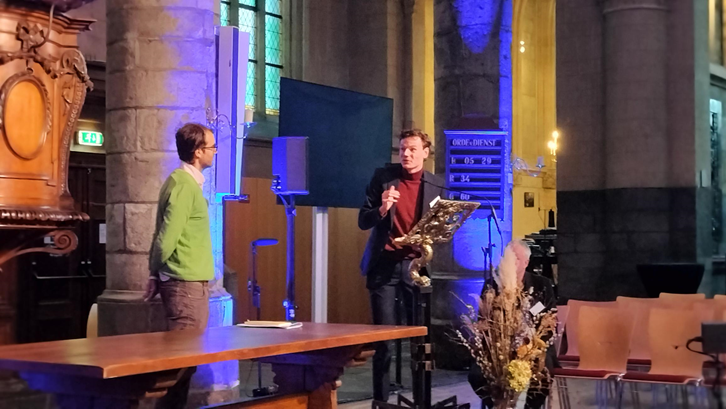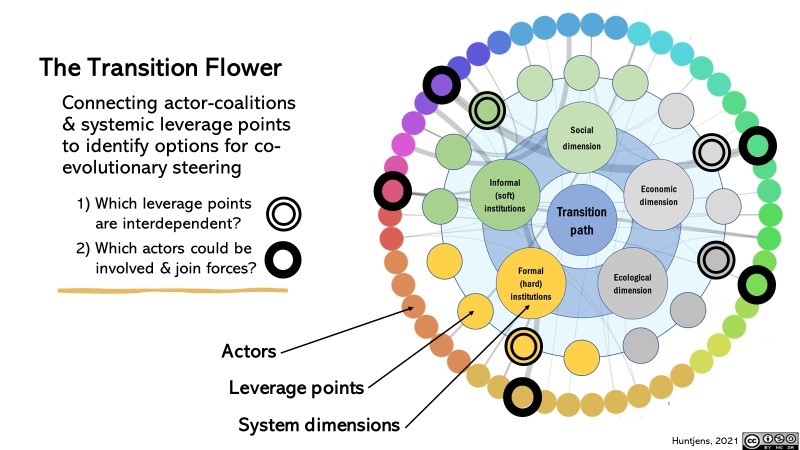A look back on 'RE-NEGOTIATE: A New Social Contract in an age of crises'
On Jan 20, a group of people met in the St Jan’s church in Maastricht to discuss the topic of a natural social contract. The conference entitled “RE-NEGOTIATE: A New Social Contract in an age of crises" preceded the inaugural lecture of Patrick Huntjens on the same topic. Speakers from across the world were present, live and via a live stream. Via the live stream 600 people watched the event. Outside it was snowing, casting a winter image on the workshop.

The opening speakers Frank Boons and Paul Ladd (the directors of MSI and UNU-RISD) mentioned the need for transformative change to deal with the ills of dangerous climate change, growing inequalities and declining trust in government and science. For those problems are not simple solution, and the interconnected nature of them calls for a perspective that considers them in relation to each other rather than separate. The notion of a different social contract was believed to hold currency, by bringing into focus the interconnections between economy and society and the need for new responsibilities and solution approaches.
From South-Africa, Kumi Naidoo (CEO of Greenpeace and former anti-apartheid activist) criticised the present social contract, in which state policies are presumed to deal with the side effects of exploitive business and in which citizenship is about voting. He made a powerful plea for citizenship based on moral courage and bolder imagination. He conveyed a message of hope: that we all can make a difference, in our capacity of consumers, workers and activists by holding those in power (financial and non-financial cooperation and governments) to account and by working towards transformative change, resulting in a better life for the many, not the few.

Hans Stegeman (Chief economist of Triodos bank) talked about accelerating transitions and the need to make the financial sector part of the solution, through impact finance and regulation of the financial sector. For achieving a prosperous life for people and thriving planet the following shifts are needed: from extractive to regenerative forms of production; from efficiency to resilience; from profit maximisation to value creation (for society); from social relations based on competition and egotism to relations that are cohesive and just. Like Kumi Nadidoo, he mentioned the enormous power of financial corporations especially asset managers who control the investments of banks and pension funds.
The Voices of Citizens, New & Future Generations were present in the next session, with presentations about the Conference on the Future of Europe (by Alvaro Oleart),Energy poverty in Europe (Marine Cornelis), Slow Food Youth Network (Maria Geuze), Shareholders of the Future (Nikki Trip in a talk about pension funds). From Maastricht, there was a presentation from UM students on eating and precious plastics and from Delft a presentation from a former MSI student on short food supply systems, using the transition flower of Patrick Huntjens. From Oliver Greenfield (the moderator), I learned a new word: omnishambles, a situation that is bad in many different ways, because things have been organized in the wrong way, causing serious mistakes to be made.
Examples of new social contract formation were the topic of discussion in the first session after lunch. Job Zomerplaag (Studio Europa Maastricht & UNU-MERIT) & Casper Gelderblom (Alderman, City of Heerlen) talked about an initiative in Heerlen aimed at reducing energy poverty, a lower environmental footprint and better health for tenants of social housing associations.

An area-specific spatial approach to sustainable agriculture (called the Markemodel), based on multiple value creation, was presented by Johan de Kleuver and from Chili and Nepal there were (on-line) presentations about social contract initiatives having to do with the rights of nature and people.
Dharmendra Kanani (Director of Strategy, Friends of Europe in Brussels) talked about a renewed Social Contract for Europe and Isabell Kempf (Head of UNRISD Bonn Office) and Najma Mohammed (Policy Director of the green Economy Coalition) talked about the Global Research and Action Network for a New Eco-Social Contract.
Concrete proposals for achieving positive change were the topic of the panel discussion. The following proposals were put forward by the first two speakers: a cap on interest rates and a debt jubilee (Hans Stegeman, Triodos Bank) and True Cost pricing and reciprocity as an organising principle (Romana Boarini, OECD). Donald Pols (Director of Milieudefensie / Friends of the Earth) talked about multinational oil companies. After winning a court case against Shell for doing too little to circumvent a climate emergency, he argued that profits from Shell from renewable energy projects for which they receive subsidies should be reinvested in new energy projects and not go to shareholders. He also want Shells to honour international climate treaties and not harm nature and communities abroad, as two additional conditions. Nikki Trip argued for a seat of young people in the board of pension funds. When it was my turn to speak, I made a plea for the following four things: 1) a Tobin tax on financial transactions (to shrink the financial sector), 2) complementary currencies for keeping money in the local economic and reward volunteers for community work, 3) area-based innovation programmes for social-ecological transformation, and 4) economics education that examines the interaction between society and economy with attention to the mechanisms behind inequality and structural causes behind natural exploitation. Time did not allow me to make more recommendations than those four.
In different ways, the different speakers spoke to the theme of a natural social contract, the topic of the inaugural speech of Patrick Huntjens. Patrick said that the present social contract, based on an egotistic view overlooks the importance of life-supporting systems on which human life and economic prosperity depends. His talking points were, first that we need to move toward a society that is more humane and fairer, regenerative instead of destructive (for both people and nature); and second that sustainability and social transitions cannot succeed without a new Natural Social Contract and a new economy that is more fair, resilient and ecologically sustainable.
Social contracts are different in each country and context. But essentially they comprise the web of relationships that bind together disparate citizens, communities, institutions and governments into a just society. A Natural Social Contract based on responsibilities for the natural environment and the (social and economic) well-being of others serves as a counter-proposal to existing social contracts based on exploitation and everyone for himself.
To navigate multipronged transformations, social actors have to find new ways to inhabit and cultivate our planet and keep it healthy for future generations. Regulations and policies to protect the natural environment are needed for this, but Patrick outlined a “value-driven whole-of-system approach” for which he developed a tool called Transition Flower, consisting of 5 dimensions (pedals) each with specific actors and intervention points for transformative change.

The beautify of his talk is that it offers a meta-frame for discussing social responsibilities and an action frame for working towards system change based on Transformative Social-Ecological Innovation, which helps to foster a different consciousness.
During the day, Maastricht turned white, as to remind us that we are part of nature as a life-supporting system. I went home with a sense of hope in a not so dark night.
Also read
-
A strong education network for Brabant and Limburg: better alignment, less dropout
On November 24, 2025, secondary schools (VO) and higher education institutions (HO) in Brabant and Limburg will sign up for the Education Network South Netherlands: one VO-HO network that will improve the flow of students to further education and reduce dropout rates.

-
Andrés Caceres Solari on No room for Human Rights in Gaza and Ukraine: How the Law Legitimizes Urban Devastation
Pick Our Brains Session with Andres Caceres Solari

-
AMIBM hosts the final Realise-Bio conference
The Aachen Maastricht Institute of Biobased Materials (AMIBM) hosted last week the third and final Realise-Bio annual conference, bringing together the Dutch and German bioeconomy ecosystems at the Brightlands Chemelot Campus.
